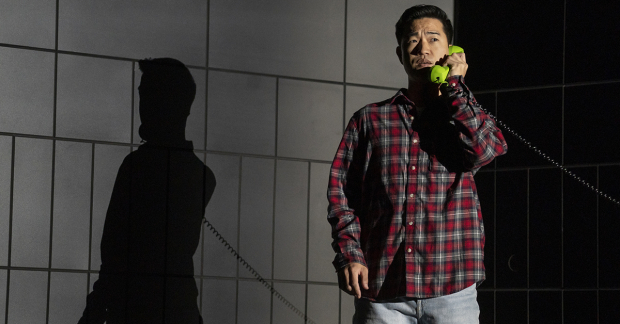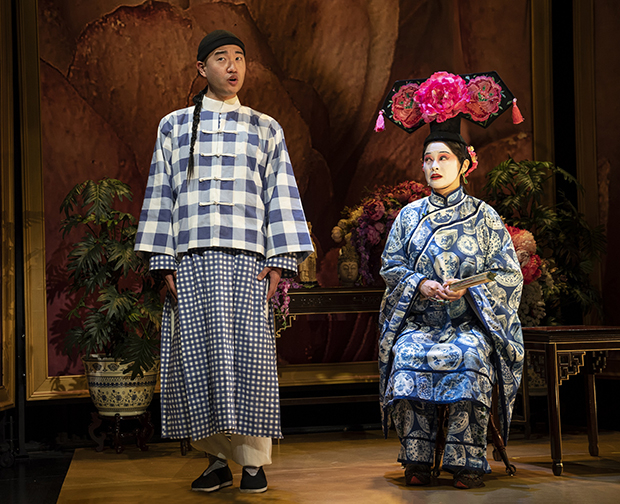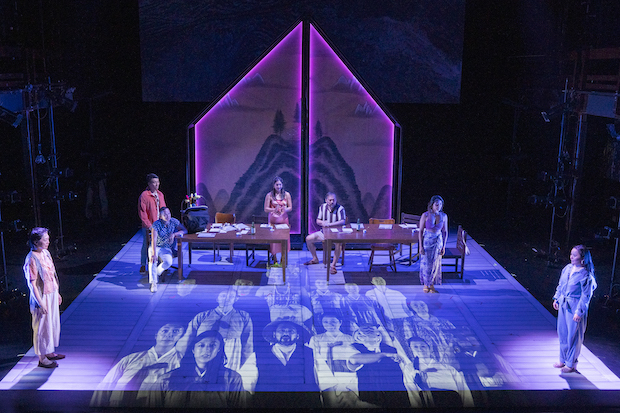Interview: Daniel K. Isaac on His Enormous and Special Year of Theater
The actor/playwright currently stars in the off-Broadway production of ”You Will Get Sick”.
As a theategoer, I will always look back on 2022 as the year I was introduced to Daniel K. Isaac. No, not in person. On stage. In March, he floored me in Lloyd Suh's The Chinese Lady at the Public, playing the sly translator of the first Chinese woman to ever set foot on US soil. He surprised me again, this time, as playwright, with the debut of his gripping play Once Upon a (Korean) Time at La MaMa (produced by Ma-Yi Theater Company). Now, Isaac (known to television audiences for his work on Billions) is back to acting in Noah Diaz's unsettling but oddly life-affirming You Will Get Sick at the Laura Pels Theatre, a Roundabout production. Here, Isaac tells us about his big year of theater, and what it all means to him.

(© Joan Marcus)
You Will Get Sick is a scary title for a play, especially in light of the pandemic. How do you describe it to your friends and family, and how does your character factor into the plot?
I always start by saying Noah Diaz wrote this play before the pandemic. While it is not a pandemic-response play, the brilliance of Noah's writing is that it transcends one specific illness or sickness or time period. The title might seem "scary," but…it's true. It's an inevitability of life, right?
And then I like to add that it's a comedy. I am surrounded by comedic geniuses. You will laugh. I promise. I hope. Please laugh. Linda Lavin and Marinda Anderson and Nate Miller and Dario Ladani Sanchez used to make me laugh so much in rehearsal that I gave up and opted to break character and get my giggles out early so I wouldn't struggle as much onstage. I am still struggling to contain my laughter though for sure.
I describe the play as the journey of a young man who receives an unnamed but life-altering diagnosis. The "unnamed" part is important. Noah and director Sam Pinkleton's genius is in not naming what the thing is. So audiences can approach it with their own experiences and perspectives. Yours truly then ends up hiring a stranger, the goddess Linda Lavin, and their misadventures together are a wild ride.
Linda Lavin is obviously a legend beyond legends. What is it like to work with her on stage in the play (and knowing every single look she gives can make the audience laugh)?
Acting opposite Linda is a gift I will treasure forever. She is a comedic genius. Watching her work is a masterclass in timing, precision, and heart. Sam has had to give us multiple notes to stop falling in love with each other onstage so much. But can you blame me? How can you not fall in love with Linda? I have a tumultuous relationship with my mother and I never had any grandparents growing up. So I like to think that the universe has gifted me this time with Linda. And I am soaking up all the love and laughter.
This has been a big year for your coming out of the pandemic, with The Chinese Lady and your own play, Once Upon a (Korean) Time. Tell us what that has been like to experience, and what it's like going from actor, to writer, to actor.
I hope my friends aren't sick of me begging them to come see all of these plays. It is an embarrassment of riches. Full stop. I understand that this is a rare and unusual year, as much as I would love for it to be the standard. So I am reminding myself to stay in the present. To have Ma-Yi Theater Company and the Public, Ma-Yi Theater Company and La MaMa, and Roundabout all in one season? This is beyond incredible.
While going from actor to writer to actor might sometimes feel a bit like whiplash, I truly believe each experience helps inform the other. And I felt such relief being in the actor's seat again. I only have to focus on this one thing rather than the whole giant thing? I know how to do that. The "one thing" is also a rare opportunity as an Asian American actor. I never leave the stage! So I feel the magnitude of that, but also trust that my prior experiences have all led me to this here today.

(© Joan Marcus)
Do you feel more of a pressure as actor delivering other people's words, or as writer, knowing that audiences are going to be watching your personal stories? Why?
When I'm acting, it's not pressure so much as a hyper-awareness of language and extreme desire to be word perfect and honor the writer's vision, and be a yes, and type of collaborator, and to channel all the empathy, and, and, and…
I find that I am able to harness this "pressure" from a macro lens of knowing what it's like to be in the actor's seat vs. the playwright's seat vs. the director. Ultimately, I want to be a vehicle that brings Noah and Sam and this team's vision to life. All mixed in with my body and brain and collaborative efforts. I care about this so deeply. And I trust in this team so much. So that makes my job much easier.
As a writer, I am unabashedly personal while completely fabricating and manipulating the "truth." The audience will decide what they want to believe is autobiographical anyway. I don't need to control that. I just hope to tap into something I'm curious about exploring. And to make space for those I don't see space made for. And to tell stories. I just want to tell stories for as long as I can. At a talkback the other day, Noah shared that he makes the type of theatre he wants to see. I fully understand and echo this sentiment.
What are you hoping audiences get out of You Will Get Sick when they see it at the Pels?
I hope audiences will come with open hearts and minds and, again, ready to laugh, and then go on the journey of examining their relationship to their bodies, to sickness, to mortality, to fear, to family, to friendship, to strangers, and to hope. I hope audiences will engage in conversation about the show and what resonated for them and where they met with friction and that they'll revel in the different experience someone sitting next to them might have had. I hope they wrestle with their discomfort rather than running away or dismissing it. I hope they breathe with us.
I hope audience members, especially those that have experienced sickness and loss, especially — especially — those who have experienced it at a younger age, might see themselves seen and heard and articulated on this stage.

(© Richard Termine)










